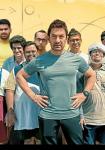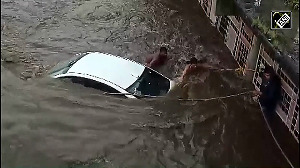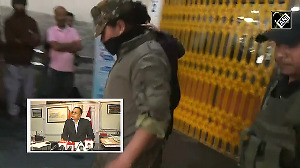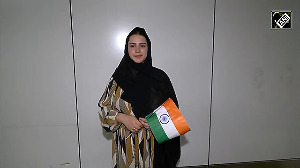Israeli fighter planes continued to pound Gaza for a second day on Sunday in the largest military operation in the area since 1967 leaving over 270 Palestinians dead.
Defence Minister Ehud Barak said Israel will expand and deepen the attacks on the Hamas-ruled territory.
Hospital sources in Gaza said at least 270 people have been killed so far and close to 800 injured in the attacks. Hundreds of Israeli troops and tanks converged at the Gaza border, indicated a possible launch of ground operations.
Israel's F-16 warplanes bombed a mosque near the Shifa hospital in Gaza on Sunday morning, destroying the structure and killing two persons, hospital officials said. The Israeli army called the mosque a base for terrorist activities.
The Al Aqsa TV station, used by Hamas, was also among the 20 targets pounded by the IDF. Its studio building was completely destroyed in the strike but the station managed to remain on air with a mobile unit.
"Operation Cast Lead" began on Saturday around 11:30 am as 64 Israeli aircrafts delivered over 100 tonnes of explosives on 50 to 100 Hamas targets in the impoverished Palestinian enclave of 1.5 million people, in retaliation to Hamas's frequent rocket attacks in Israeli territory.
"The Israeli Defence Forces will expand and deepen its operations in Gaza as much as necessary," Defence Minister Barak told reporters before a cabinet meeting.
He had on Saturday said Israel cannot really accept a ceasefire with the Hamas, rejecting calls by the United Nations and the European Union for a truce.
"There is a time for calm and a time for fighting, and now the time has come to fight," he said.
"For us to be asked to have a ceasefire with Hamas is like asking you to have a cease-fire with Al-Qaida," Barak told Fox News.
Asked whether Israel would follow up the air strikes with a ground offensive, the defence minister said, "If boots on the ground will be needed, they will be there... Our intention is to totally change the rules of the game".
Among the killed in Israeli air strikes were three senior Hamas officers, Tawfik Jabber, the commander of Hamas' police force in Gaza,; his deputy, Ismail al-Ja'abri and Abu-Ahmad Ashur, Hamas' Gaza central district governor.
Twelve hours after the strike was launched, at least 270 people had been killed and 780 wounded, bringing hospital services to the brink of collapse.
The Islamist Hamas faction in control of the territory since June 2006, vowed revenge by renewing threats of suicide attacks inside Israel and intensifying rocket attacks on Israel's southern territories.
"The Israeli occupation needs to know that it has cast itself into the fire," said Abu Obeida, spokesman for Hamas' military wing, the Iz al-Din al-Qassam Brigades.
110 Kassam rockets and mortar shells hit Israel on Saturday, the farthest of which landed 27 kilometres from its launcher inside Gaza.
The Israeli army warned that it is still expecting Hamas to recuperate from the initial shock and fire up to 200 rockets a day on Israel.
The unprecedented attacks elicited condemnation across the Arab world, even as the US sided with Israel and blamed Hamas for the violence.
In a televised statement, Prime Minister Ehud Olmert said that the goal of the operation was to bring about a fundamental improvement in the security situation of the residents of the southern part of the country.
Asking Israeli residents of the southern communes to be patient he said, "It could take some time."
Barak on Sunday allowed crossings into Gaza to be opened for humanitarian aid to go through, trying to signal to the world that Israel was fighting a war against Hamas, but not against the civilian population.
The trucks carrying the humanitarian aid were scheduled to enter Gaza through the Keren Shalom crossing at 11 am local time.
The Israeli army has claimed there have been only 15 civilian casualties in Gaza, a figure disputed by medics in the Strip.





